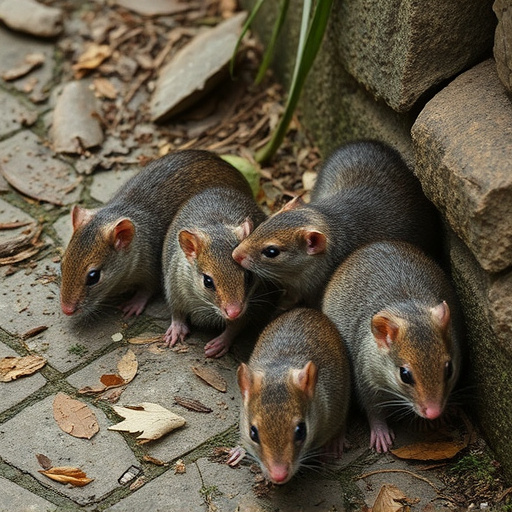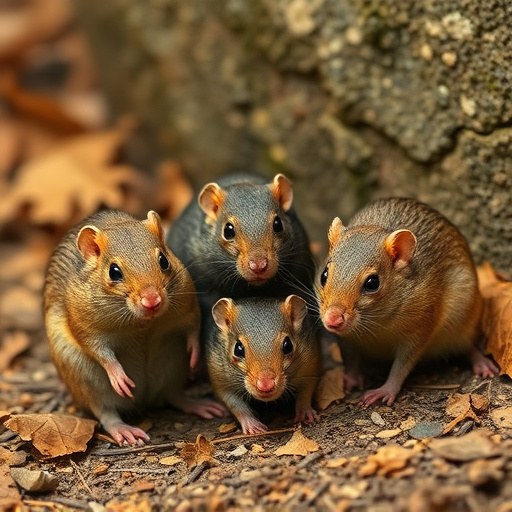Rodents are integral to Tucson's ecosystem, and understanding their behavior is key for humane and eco-friendly rodent control. By studying habitat preferences and employing non-toxic methods like live traps, natural deterrents, and habitat modification, residents can effectively manage rodent presence while preserving biodiversity. Community initiatives focus on a comprehensive, responsible approach tailored to Tucson's unique needs, reducing reliance on toxic chemicals.
Tucson, with its diverse ecosystem, requires innovative yet humane approaches to rodent control. This article explores eco-friendly methods tailored to the local environment and wildlife. We delve into understanding rodent behavior in Tucson’s landscape, providing insights for effective, non-toxic trapping and deterrents. Additionally, we highlight community initiatives and expert advice for managing rodent populations sustainably, ensuring a balance between urban habitats and natural ecosystems. Discover how these strategies can contribute to a greener, more harmonious Tucson.
- Understanding Rodent Behavior in Tucson's Ecosystem
- Non-Toxic Traps and Deterrents for Humane Control
- Community Initiatives and Expert Advice for Eco-Friendly Management
Understanding Rodent Behavior in Tucson's Ecosystem

Rodents, such as mice and rats, are an integral part of Tucson’s diverse ecosystem. Understanding their behavior is crucial for implementing effective and humane rodent control methods in this unique environment. In the desert regions, rodents play a vital role in maintaining ecological balance by contributing to seed dispersal and serving as prey for various predators.
In Tucson, these creatures often seek shelter and food sources near human settlements due to the availability of resources and suitable habitats. They are attracted to areas with abundant vegetation, water sources, and structures that provide protection from predators. By studying their behavior patterns, residents can identify potential entry points into homes or buildings and take proactive measures to discourage their presence. This knowledge is essential for adopting eco-friendly rodent control tactics, ensuring the well-being of both wildlife and humans in the Tucson community.
Non-Toxic Traps and Deterrents for Humane Control

In the quest for effective yet compassionate rodent control, Tucson residents have a variety of non-toxic traps and deterrents to choose from. These humane methods prioritize the welfare of both animals and humans while addressing the presence of rodents in homes and gardens. Instead of relying on poisonous substances, which can be harmful to pets and wildlife, these alternatives offer safe and environmentally friendly solutions for rodent management.
One popular approach involves the use of live traps, designed to capture rodents without causing them harm. These traps are baited with food or pheromones, enticing rodents inside where they can be released far from residential areas. Additionally, natural deterrents like peppermint oil, cinnamon, and hot peppers can effectively ward off rodents due to their strong odors and spicy properties. By employing these non-toxic methods, Tucson communities can achieve effective rodent control while maintaining a safe and sustainable environment.
Community Initiatives and Expert Advice for Eco-Friendly Management

In the pursuit of effective yet eco-friendly rodent control in Tucson, community initiatives and expert advice play a pivotal role. Local organizations and pest management professionals are championing innovative strategies that harmonize with the natural environment while addressing rodent infestations. These methods include the use of natural repellents, habitat modification, and humane traps, reducing reliance on toxic chemicals.
Community-led efforts involve collaborative clean-up campaigns and educational programs aimed at removing food sources and hiding places that attract rodents. Experts recommend sealing entry points, maintaining proper sanitation, and employing non-lethal traps as cornerstone measures. By combining these approaches, Tucson residents can achieve robust rodent control while preserving the region’s unique biodiversity and promoting a healthier ecosystem.
In conclusion, adopting eco-friendly and humane rodent control methods in Tucson is both responsible and effective. By understanding local rodent behavior, utilizing non-toxic traps and deterrents, and leveraging community initiatives, residents can significantly reduce the impact on both their properties and the broader ecosystem. These strategies not only minimize harm to wildlife but also contribute to a healthier, more sustainable environment for all Tucson residents. When it comes to rodent control Tucson, these innovative approaches are the way forward.
